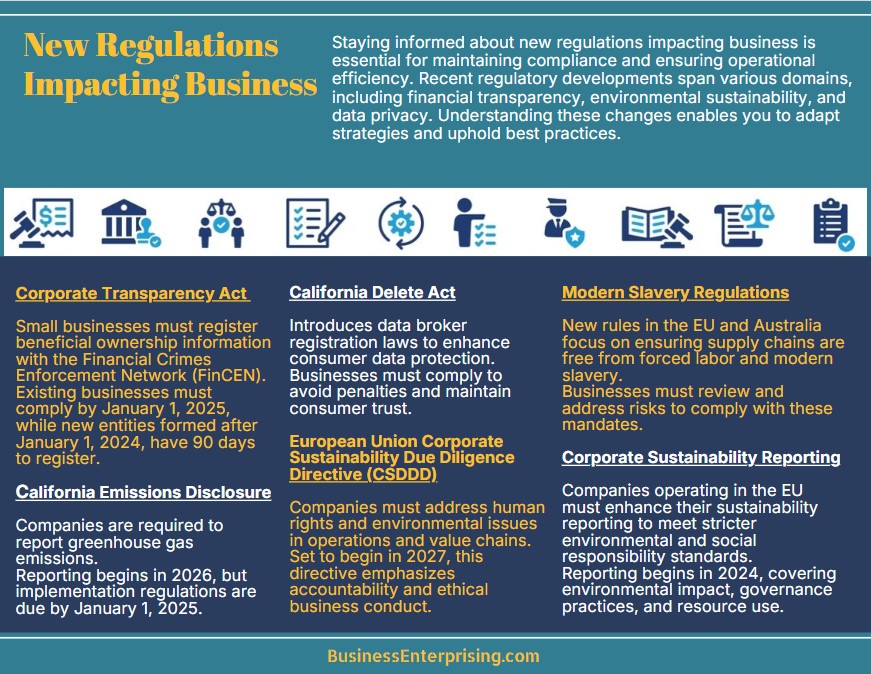 New regulations impacting business continue to shape how companies operate and stay competitive. These changes often address evolving industry standards and consumer expectations. However, adapting to new compliance requirements can challenge your resources and processes. Understanding these updates helps you prepare effectively and avoid potential disruptions.
New regulations impacting business continue to shape how companies operate and stay competitive. These changes often address evolving industry standards and consumer expectations. However, adapting to new compliance requirements can challenge your resources and processes. Understanding these updates helps you prepare effectively and avoid potential disruptions.
Additionally, regulations vary by industry, influencing everything from environmental practices to data privacy. Staying informed about these changes allows you to identify risks and opportunities for improvement. Proactively adjusting policies and procedures ensures compliance while maintaining trust with your customers and partners.
By focusing on strategies to manage new regulations impacting business, you can position your company for long-term success. Preparation and adaptability are key to thriving in today’s dynamic regulatory landscape.
Overview of Recent Regulatory Changes
Navigating the evolving landscape of new regulations impacting business is essential for maintaining compliance and operational efficiency. Recent regulatory changes span various sectors, each with significant implications.
The Corporate Transparency Act (CTA) mandates that businesses disclose their beneficial ownership information to the Financial Crimes Enforcement Network (FinCEN). This measure aims to combat illicit financial activities by increasing transparency. Existing businesses must comply by January 1, 2025, while new entities formed after January 1, 2024, have 90 days to submit their information. Non-compliance can result in penalties up to $10,000.
In the financial sector, the U.S. Federal Reserve is proposing significant modifications to its annual bank stress tests. These changes, influenced by recent legal rulings, aim to enhance transparency and reduce capital requirement volatility. Proposed adjustments include allowing banks to comment on stress test models and averaging results over two years. These developments could affect capital planning and risk management strategies within financial institutions.
Additionally, the Federal Trade Commission (FTC) has introduced a rule requiring companies to simplify the cancellation process for subscription services. Dubbed the “click to cancel” rule, it mandates that canceling a subscription must be as straightforward as signing up. This rule, effective 180 days after its publication in the Federal Register, necessitates that businesses offering subscription services review and adjust their cancellation procedures to ensure compliance.
Furthermore, the FTC has finalized a ban on fake online reviews and testimonials. This regulation prohibits companies from purchasing or disseminating deceptive reviews, aiming to enhance consumer trust in online platforms. Businesses must now ensure that all reviews and testimonials associated with their products or services are authentic and not misleading.
Staying informed about these new regulations impacting business is crucial. Regularly consulting official regulatory bodies and seeking professional advice can help you adapt to these changes effectively.
Compliance Requirements for Small and Medium Businesses
New regulations impacting business can create challenges for small and medium enterprises, especially when it comes to meeting compliance requirements. Smaller businesses often have fewer resources to dedicate to compliance, which can make navigating new rules more demanding. However, taking proactive steps can help you adapt effectively.
One common challenge is staying updated on regulatory changes. New rules may require adjustments to your operations, such as modifying procedures or updating documentation. For example, the Corporate Transparency Act now mandates reporting beneficial ownership information. Additionally, subscription-based businesses must comply with the FTC’s “click-to-cancel” rule, simplifying cancellation processes.
To meet compliance standards, start by identifying which regulations apply to your business. Consulting with legal or regulatory experts can help you interpret requirements and avoid penalties. Additionally, using compliance management software can streamline tracking and ensure you meet deadlines. These tools are especially useful for small teams juggling multiple responsibilities.
Training your employees on new regulations is another important step. Compliance often involves changes in day-to-day activities, so clear communication is essential. Additionally, maintaining accurate records of training sessions and updated policies can demonstrate your commitment to compliance.
By staying informed and preparing your business for new regulations impacting business, you can minimize disruptions and maintain trust with customers and partners. A proactive approach not only reduces risk but also positions your business for long-term success.
Industry-Specific Regulatory Changes
New regulations impacting business often target specific industries, shaping how companies operate and deliver their services. In healthcare, updates to patient data privacy laws require enhanced security measures to protect sensitive information. Additionally, stricter compliance standards for telehealth platforms ensure the reliability of remote healthcare services. These changes may require healthcare providers to invest in advanced technology and employee training.
In the technology sector, data privacy and cybersecurity remain top priorities. Regulations like the General Data Protection Regulation (GDPR) and emerging U.S. state privacy laws impact how companies handle user data. Furthermore, the increasing focus on artificial intelligence has led to proposed guidelines for ethical AI development. Businesses in this sector must adapt quickly to comply with these evolving standards while maintaining innovation.
Manufacturing faces its own set of challenges, especially with environmental regulations. Updates in emissions reporting and waste disposal guidelines require manufacturers to adopt more sustainable practices. For example, mandates on carbon emissions may push companies to explore cleaner production methods. Additionally, new rules on supply chain transparency ensure ethical sourcing and production.
By understanding these industry-specific changes, you can prepare for their effects on your business. Adapting to new regulations impacting business in your sector requires a proactive approach. Reviewing operational practices and leveraging expert advice can help you stay compliant while minimizing disruptions. These efforts not only ensure adherence but also demonstrate your commitment to responsible and ethical operations.
Data Privacy and Cybersecurity Regulations
New regulations impacting business increasingly focus on data privacy and cybersecurity to address growing concerns about digital security. Laws such as the General Data Protection Regulation (GDPR) and California Consumer Privacy Act (CCPA) set strict requirements for handling personal information. Additionally, emerging state and international regulations emphasize transparency, consent, and secure data storage practices.
To comply with these laws, businesses must evaluate how they collect, store, and use customer data. For example, implementing encryption protocols and regular security audits can help protect sensitive information. Additionally, reviewing your privacy policies ensures they meet regulatory standards and clearly inform customers about their rights.
Cybersecurity measures are another critical area of focus. Recent legislation highlights the need for robust defenses against cyber threats, including ransomware and data breaches. Therefore, adopting multi-factor authentication and monitoring systems can strengthen your organization’s security posture. Training employees on recognizing phishing attempts and handling sensitive information also plays a key role in compliance.
Adjusting to these new regulations impacting business requires a proactive approach. Regularly updating your technology and reviewing compliance policies ensures your practices remain current. By prioritizing data privacy and cybersecurity, you not only avoid penalties but also build trust with your customers. These efforts help safeguard your business in an increasingly digital world.
Environmental and Sustainability Mandates
New regulations impacting business increasingly emphasize environmental sustainability, pushing companies to reduce their carbon emissions and improve sustainability reporting. These mandates aim to address climate change and encourage more responsible business practices. Additionally, businesses are expected to adopt greener operations and demonstrate transparency in their environmental impact.
Carbon emissions regulations, such as stricter limits and reporting requirements, challenge companies to rethink their energy usage and production methods. For example, businesses may need to invest in renewable energy sources or upgrade equipment to meet lower emissions thresholds. These changes not only reduce environmental impact but can also lower long-term operational costs.
Sustainability reporting plays a significant role in these mandates. Many regulations now require companies to disclose their environmental performance and sustainability initiatives. Therefore, adopting clear metrics and tracking progress are essential for compliance. This transparency can also enhance your company’s reputation by showcasing a commitment to responsible practices.
Adjusting to these regulations often involves revising supply chain processes and evaluating resource consumption. For instance, businesses might switch to eco-friendly materials or adopt circular economy principles. Additionally, collaboration with suppliers and partners ensures alignment with environmental goals across operations.
By adapting to these new regulations impacting business, you position your company as a leader in sustainability. These efforts not only support compliance but also contribute to a healthier planet and stronger relationships with customers who value eco-conscious practices.
Adapting to Regulatory Changes
Adapting to new regulations impacting business requires proactive strategies to stay ahead of compliance issues. Regularly updating policies, investing in training, and leveraging technology can help your business respond effectively. By taking these steps, you can minimize risks and maintain operational efficiency.
Training your employees on regulatory changes is essential. Clear communication about new requirements ensures your team understands their responsibilities. Additionally, conducting regular workshops or online courses can keep your staff informed and ready to implement updates. This approach fosters a culture of accountability and awareness.
Policy updates are another critical step in adapting to regulatory changes. Reviewing and revising internal procedures ensures alignment with new laws. For instance, updating your data protection policy to meet privacy regulations demonstrates your commitment to compliance. Additionally, maintaining accurate documentation of these changes can help you avoid penalties during audits.
Technology plays a significant role in managing compliance efficiently. Compliance management software helps track deadlines, monitor activities, and generate reports. Additionally, using tools like data analytics or automated workflows simplifies adherence to complex regulations. Investing in technology not only saves time but also reduces the likelihood of human error.
By staying informed and adopting these strategies, you can navigate new regulations impacting business with confidence. These efforts not only support compliance but also build trust with customers and partners. Proactive adaptation positions your business for long-term success in an ever-evolving regulatory environment.
Conclusion
Adapting to new regulations impacting business is essential for maintaining compliance and staying competitive. Regulatory changes can influence operations, requiring businesses to adjust processes and policies. However, with proactive strategies like training, policy updates, and leveraging technology, you can stay ahead of these challenges.
Additionally, staying informed about regulatory updates allows you to respond quickly and avoid costly penalties. Building a culture of compliance ensures your team understands their roles and responsibilities. By focusing on clear communication and preparation, you can reduce risks and strengthen trust with customers and partners.
Navigating new regulations impacting business may seem complex, but it offers opportunities to improve operations and demonstrate accountability. With the right approach, you position your business for sustainable growth in a rapidly evolving environment.



